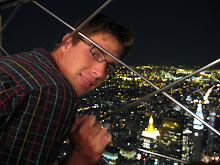One long boring day in first year, a high school friend of mine and I had discovered one of the most useful tools on the Internet, Wikipedia.
Wikipedia as you are probably familiar with is a citizen media site where people can edit and add content to entries much like an Encyclopedia however, it can be updated instantly and constantly as events occur.
Of course there are monitors on these type of sites which read content and delete untrue or unsourced information for major articles. But what about the smaller articles that people don't typically read?
My friend and I edited three topics on Wikipedia. One to say that I "Wade Halicki" created Islam, that I dated Katie Holmes (before Tom Cruise, obviously) and that I was writting songs for my favourite band, Thrice. Consequently, we received several messages on Wikipedia that edits from our IP would not be accepted any longer, the Katie Holmes and Islam pages were quickly edited back and locked for several weeks.
The Thrice page with the information that I co-wrote a song still exists till this day, three years after the fact, as seen on song two.
This is not the problem however. Shortly after we edited Wikipedia other lyric sites began to get their information about songs and albums from wikipedia. Consequently, if you search my name on google, you get 3500 hits, a majority of which state that I wrote this song, which of course I did not.
So, the dangers of citezen media are quite apparent. If one source is wrong or edited improperly and a nother source uses the same information as well as a nother and so on, this information becomes a truth on the internet. The non-fact that I wrote a song for Thrice is featured in over 3000 websites in the duration of three years, how could it not be true???
Thursday, March 12, 2009
Subscribe to:
Post Comments (Atom)

Hmmm interesting. I'm actually writing my essay on this. I think the nature of Wikipedia has changed much since your experiment. Most pages on Wikipedia are checked within - don't quote me on this - 5 minutes by editors. Anything changed on a page is usually discussed about in the discussion boards and a post by a guest user is often flagged immediately as un-factual by the editors of that page, or just edited right away and then discussed about in the discussion boards to determine if it is accurate or not.
ReplyDeleteI would imagine that even Thrice's page has a few editors who constantly check up on the page for validity. But I'm sure that as the deemed importance of the page decreases, so does the amount of people who care to constantly verify its validity, ergo so to does the information. With Wikipedia we risk misinformation when it comes to the more trivial facts, like who wrote a thrice song.
That is an interesting and informative experiment that you performed Wade. It shows that although facts a figures are checked very frequenty on Wikipedia, sometimes the truth is not always displayed. Your experiment shows that there are flas in the editing process of Wikipedia and although most of the information displayed has been edited and verified, some of the little unknown facts such as your "ability to write lyrics" go unnoticed and credibility is unjustified. I might go on Wikipedia and sa that I myself wrote the lyrics to a song entitled "Stairway to Heaven"...just kidding. Perhaps a song that is less popular.
ReplyDeleteThis is exactly why citizen media and journalism differ so much, but are still often confused. The internet is such a scary place when it comes to validity of facts.
ReplyDeleteI find that sites such as Wikipedia are not as much of a risk because most people are aware that anyone is able to post on the site- that trouble lays on other websites and internet spaces where people are able to post anything and others may not be aware that the information is not actually true. You mentioned that your name is still out there online from all these years ago. Ive been thinking about that a lot lately- and the truth of the matter is that people in general are not warry enough of what they post online. It has ther potential to stick around forever. Your post on Wikipedia was clearly a joke and not as serious a thing to worry about- but with Facebook being as prominent as it has become, I personally feel that people should be more careful about what goes up online. Every now and again I will come across a photo that I did not even knew existed, and thankfully nothing incriminating has gone up, but the fact that once its there- its there forever- really frightens me.
We've all come to learn that potential employers, family members and friends alike all have acces to our Facebook accounts, blogs and the internet as a whole. The permanency of the internet should be taken more seriously.